Google only loves you when everyone else does.
I forget who said it, but it’s true, Google takes notice when everyone starts to love you. SEO has been around ever since search engine rank pages (SERPs) have gotten more and more competitive. And as the world wide web continues to scale, I imagine seeing results off of your SEO efforts will become harder and harder to recognize. The reason I’m interested in SEO is because it’s kind of like a game of chess. It doesn’t matter how much money you throw at it or how much you sweet-talk it, good SEO is a long and strategic game. And good SEO implementation always starts with one thing — research. Specifically, keyword research.
Keyword research is the foundation to any good SEO campaign. Now for those of you new to the tech world and SEO, it stands for Search Engine Optimization. It’s a methodology of strategies, techniques, and tactics used to increase the amount of visitors to your website by obtaining a high-ranking placement in the search results of a SERP. You don’t have to be born of royal blood to have good SEO, you don’t need to be the daughter of a hip-hop mogul; you just need to outsmart the competition.
Search terms to search for…
To start, you’ll want to have a keyword in mind. A keyword that you’ll want your website or your web page/post to rank for. Let’s start with an easy example:
My father blogs about wine at TheWitIsOut.com and he wants to rank for terms like “red wine” and “best wine” — only issue is that these search terms are extremely hard to rank for. Why? Because they are considered ‘head’ terms or terms that are most frequently searched which usually carries with it some steep competition. But head terms can also be ambiguous and not as relevant as other terms. When deciding what keywords you’d like your site to rank for, you want to look at 3 different areas:
- Relevance: the keyword needs to accurately reflect the nature of your product, services, or offerings
- Volume: the number of searches per month for a particular keyword
- Competition: the number of websites or web pages competing for a particular keyword or search term
Ideally, you’d like to find a keyword or search term that has a high number of searches (volume) and a low number of competing websites (competition), and is highly pertinent to your offering (relevance) — if we can just find that keyword, we’ll be all set – LOL!
Tools for searching for search terms…
Although SEO can be a bit of trial and error because search engines (and their algorithms) constantly change, Google does offer some really cool tools to aid in our keyword research. Remember earlier when I talked about head terms and how they are the more frequent terms that are searched. Keywords like ‘red wine,’ ‘car’ and ‘Mac’ – Well, there are also terms called long-tail terms, these are the terms that we’ll be looking at.
Head vs. Long-tail
- ‘red wine’ —— ‘2003 red wine cabernet’
- ‘car’ —— ‘2013 Hyundai Accent’
- ‘Mac’ —— ‘ used Macbook Pro’
Just a few examples – but we can test all these examples for volume and competition with a little tool called the Keyword Planner. Now, you’ll need to sign up for an account with Google Adwords, but don’t fret, you don’t have to spend any money if you don’t want to. The thing that we’re interested in are the tools.
The Keyword Planner will ask you where you’d like to start, and just click on the “search for new keywords” which will pop open a form that looks like this:
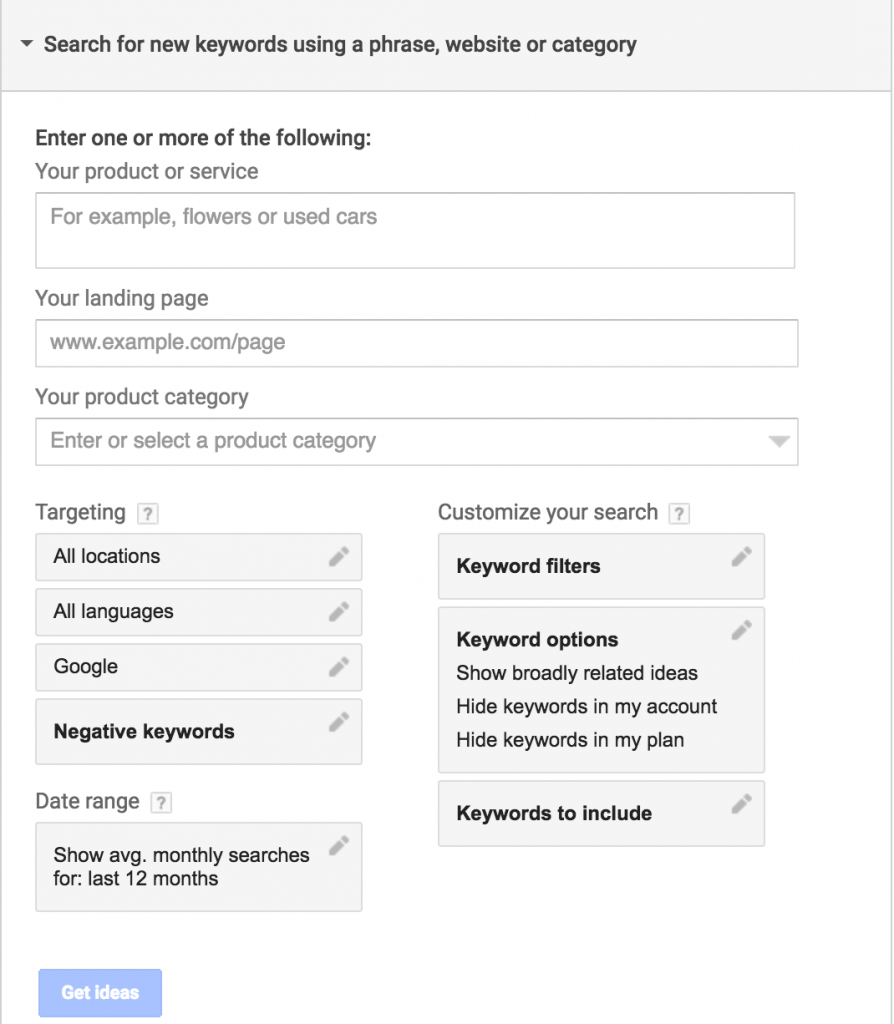
Now, if you’ll notice at the top you can enter in certain phrases or keywords. You can also select a product category. Or target a certain region or state or city, and you can change filters to show only closely related keywords or broadly related keywords. Let’s type in ‘red wine’ and see what comes back.
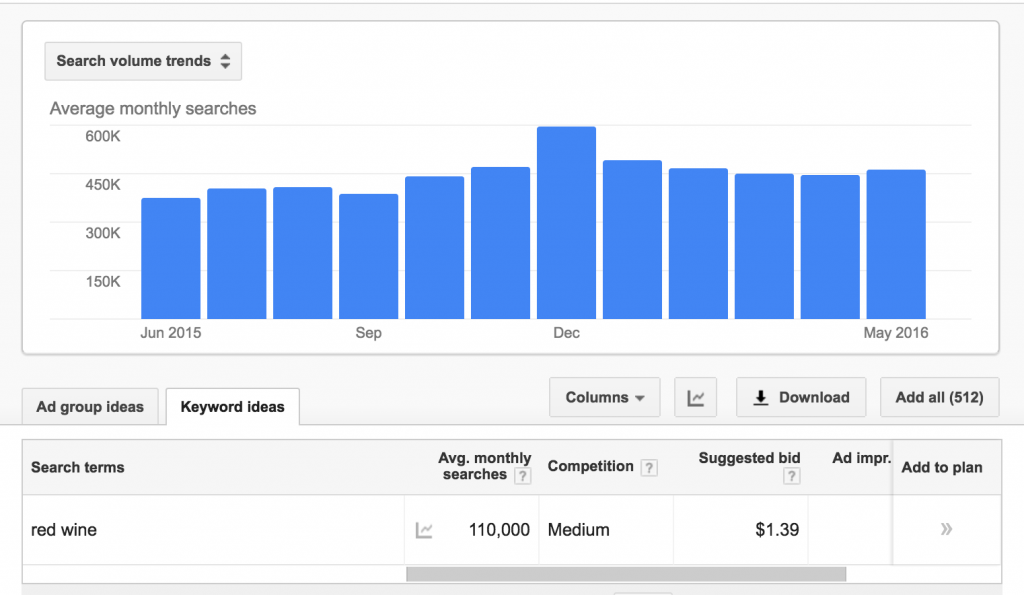
As you can see, the average monthly search is about 110k searches. In the graph, we can see that December is the month with the most searches (most likely because of the holiday season) and surprisingly the competition is only at a medium right now, not high! So, that’s interesting. But it does give us a number of other keyword ideas that could potentially help in our SEO efforts.
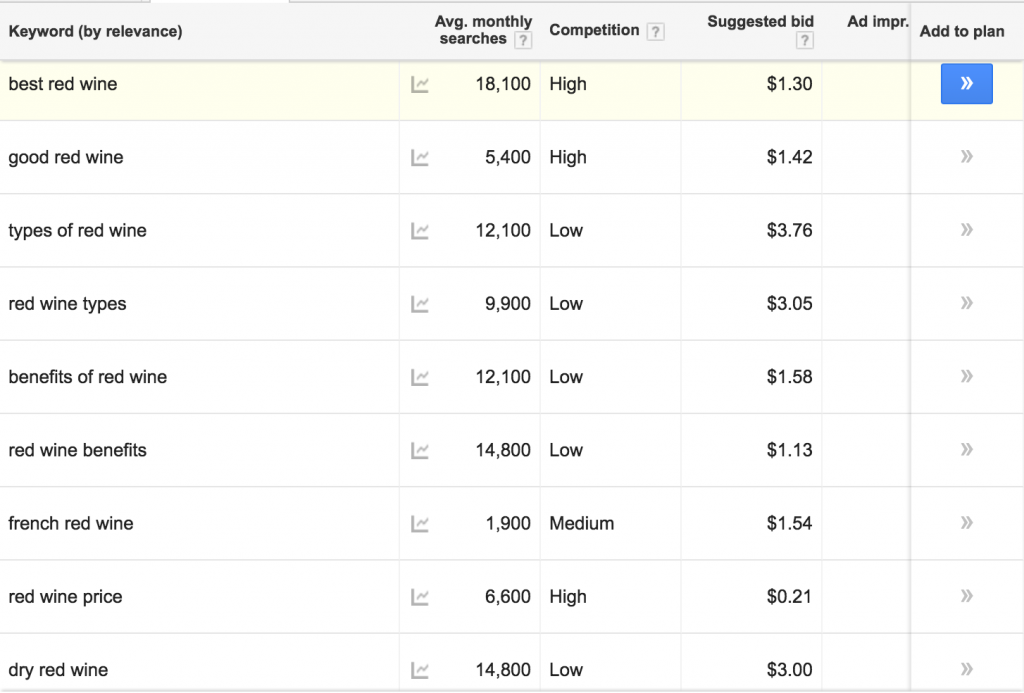
The Keyword Planner suggests different keywords for us. Look at the first one in the list ‘best red wine’ – this one has got a lot of volume (which is good), but it’s also got a boat ton of competition (which is not so good!). But let’s go down to ‘types of red wine’ – this volume is also pretty high at 12k average monthly searches, but the competition is pretty low. You can download this list into an Excel or Google sheet to get more accurate information. Let’s do that.
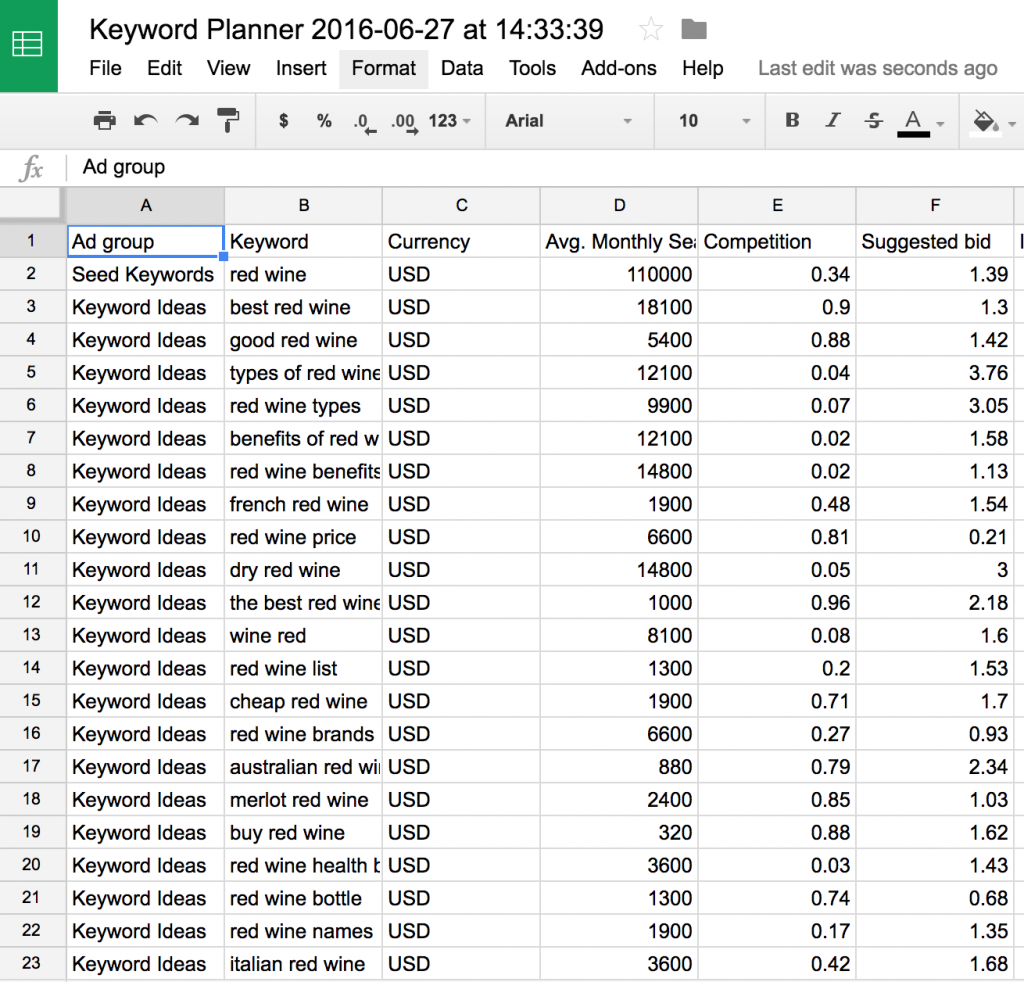
As you can see, we get a complete list of recommended search terms and actual numbers to go with their competition, not just a level of high, medium, or low. Now if we look at ‘types of red wine’ we’ll see that the average monthly searches is still at 12k, but the competition is .04 – that’s super low! Super low! So, before you go and use this as your keyword, you have to put yourself in the shoes of your user (or the searcher). Would this search term be good for my dad to use on his blog? I’m not quite sure yet. I always get a little weary when the search term seems relevant and there’s a high number of searches (volume), but the competition is really low. So let’s dive deeper.
My dad blogs about wine; wineries, vintage wine, wine reviews, wine ratings and the like. His ideal visitor is someone who is interested in wine and wants to get good recommendations, but also someone who is just starting to get interested in wine—the novice wine taster. If you put yourself in the shoes of the person searching for ‘types of red wine’ what do you think they are looking for? Probably types of red wine – lol! But the issue is this — we don’t know their intent. Maybe they are searching for types of red wine because they want to buy some, or maybe they just want to learn what types of red wine are out there. If you look at the next search term down ‘benefits of red wine’ – it’s the same thing (high volume, low competition) but my guess is that people searching for that term are concerned about the dietary or health aspects of wine. But still, it could be a good term to try and rank for if you have a wine blog. Either way, I think both of those would be good for my father’s site.
Another tool you can use is Google Trends. Google Trends will show you how often a particular search term is entered and compare it to search volume across various regions of the world and will compare it to different search terms as well. One thing I like to do is singular vs. plural. In the example ‘types of red wine’ we can see if the keyword phrase ‘type of red wine’ is searched more often. Let’s take a look:
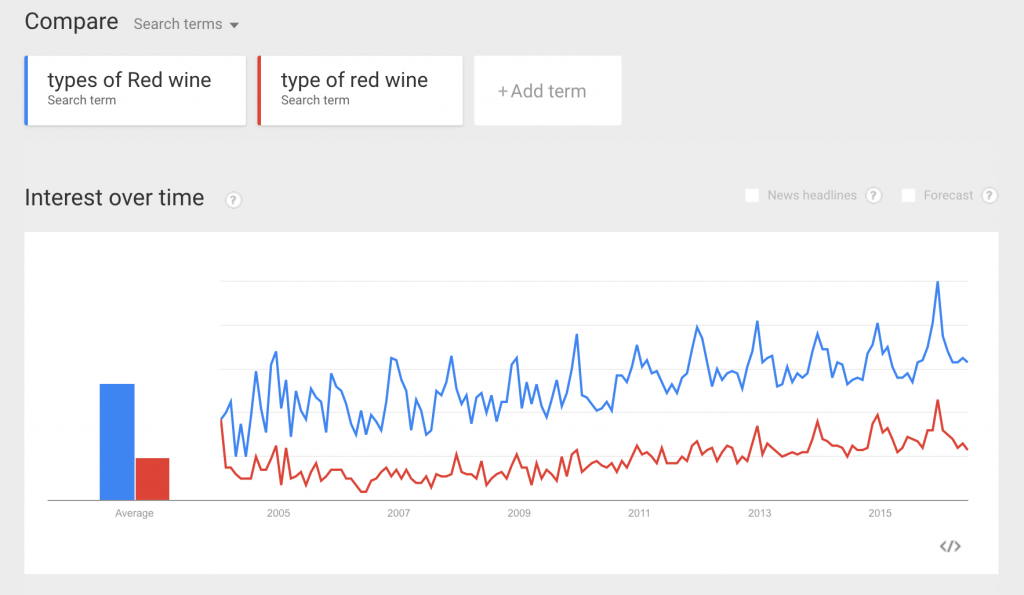
As we can see, ‘types of red wine’ are searched more often than ‘type of red wine’ — so I think it’s safe to say that we can go with ‘types of red wine’ as our keyword phrase.
Keyword distribution…
You’ll want to distribute your keywords appropriately across your website and the easiest way to do that is in a spreadsheet. Ugh, not another spreadsheet! Yup! Map out your entire site and list these categories:
- Pages
- Keywords
- URLs
- Titles (preferably under 65 characters)
- Meta-descriptions (preferably under 65 characters) – these don’t so much help with SEO anymore, but they will help with your click-thru rate. And being under 65 characters, you can be sure the search engine won’t truncate any of the text that’s viewed to the user
- H1’s (the biggest header on your page or post)
You can populate a spreadsheet with your existing content, this’ll make it easy to spot duplicates. Search engines want unique and relevant information. Unique and relevant…
Things to remember with keyword research…
Remember, you have to look at the keyword attributes of relevance, volume, and competition. Relevant keywords are much more likely to drive conversions on your site, than ones that are broadly related. Volume is the number of average monthly searches and you can find this using Google Adwords Keyword Planner, as well as the competition, which is the number of other sites trying to rank or compete for the same keyword phrase. You can download the Keyword Planner results to a spreadsheet which give you a much better reflection of the competition in numeric results.
The other thing you need to remember is that SEO is an on-going process. It’s a long and strategic game. So, you need to evaluate your SEO and keyword research continually. The industry changes constantly, the market changes constantly, the competition changes constantly. You need to be able to adapt to the change as well, so evaluate your keywords on a quarterly basis, see if traffic or conversions on your site are going up or down and re-adjust. More to come on the topic of SEO.

